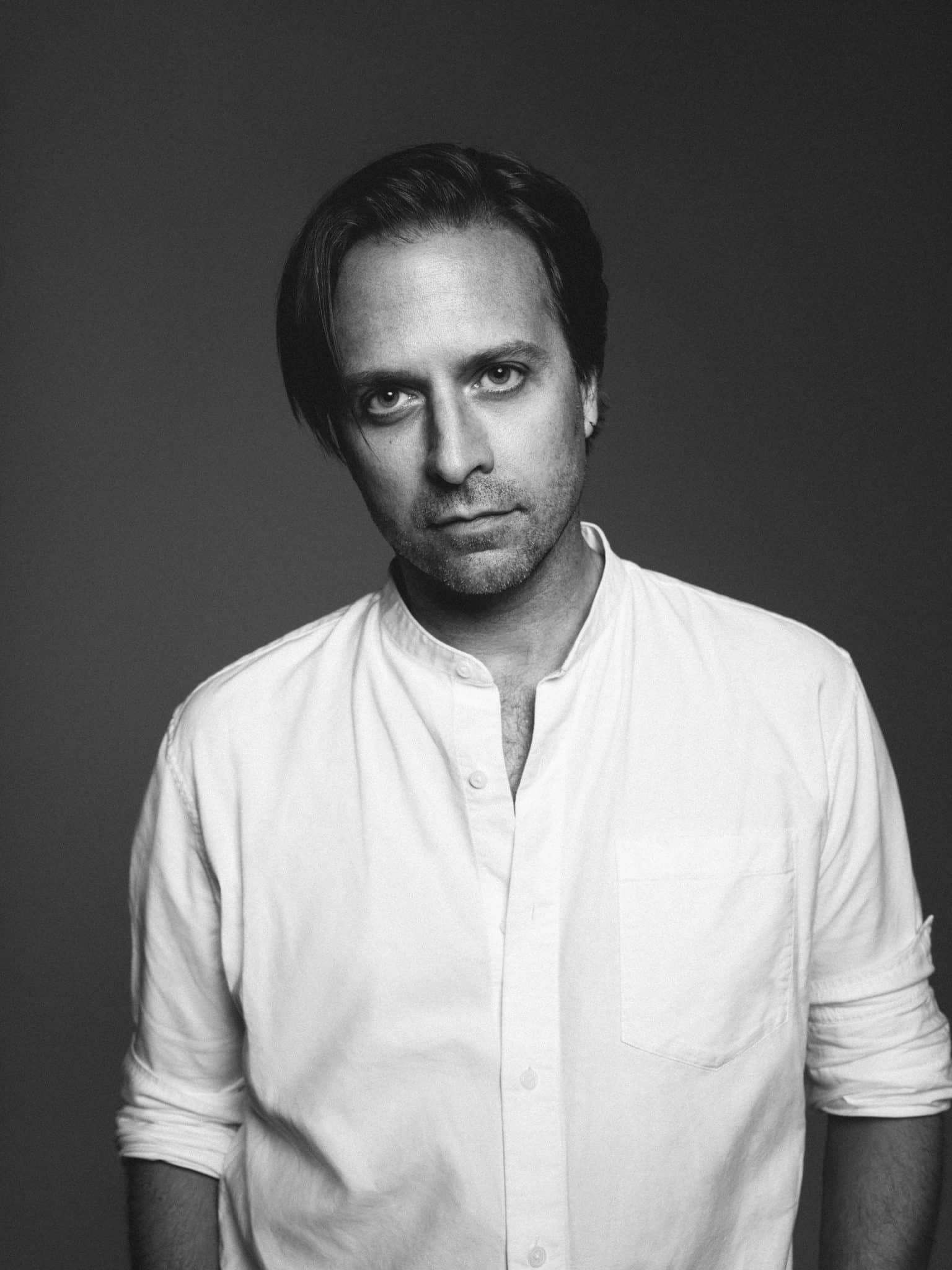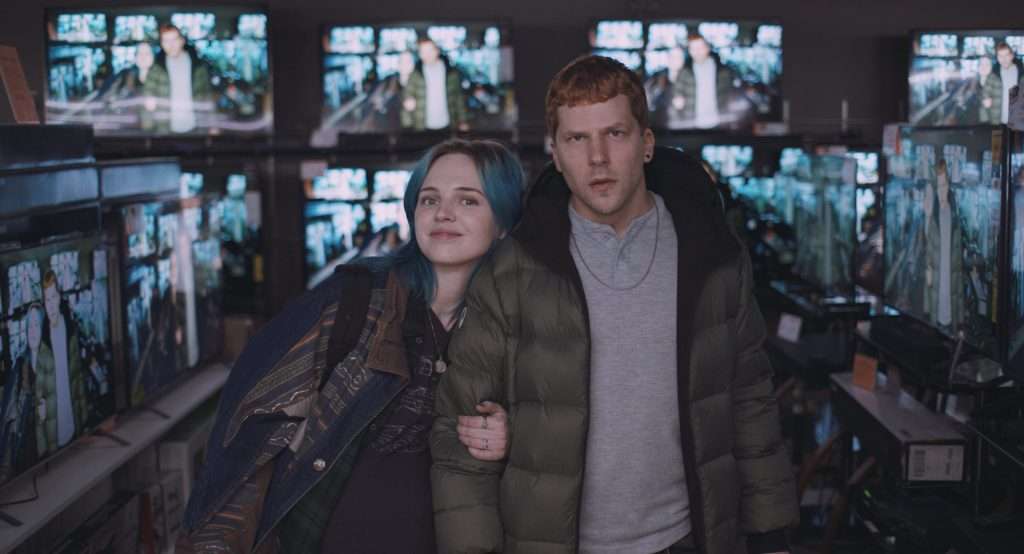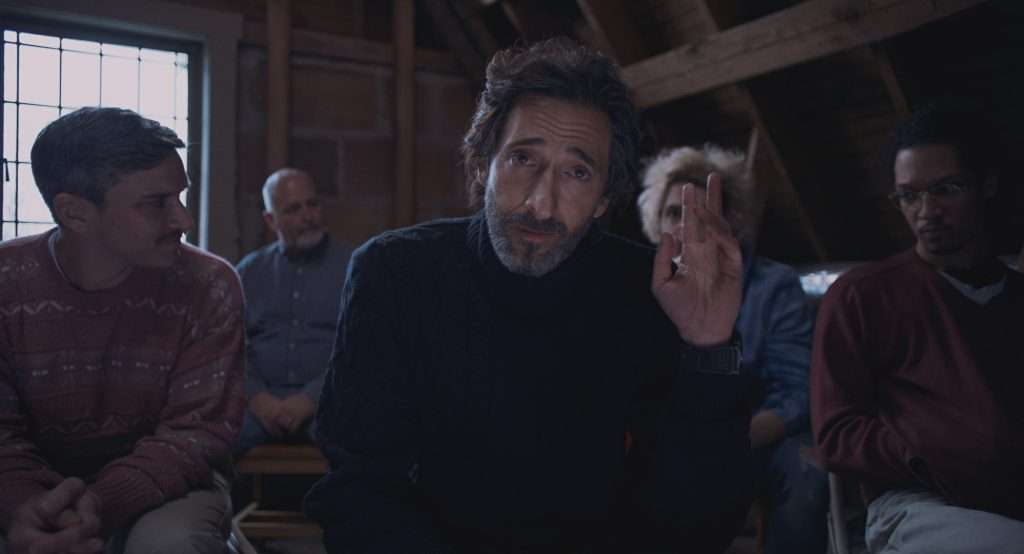
Dialling in to discuss his new film Manodrome, director-writer John Trengove describes the disturbingly-relevant ‘incel’ thriller as a mirror-reflection of the male audience members who have felt targeted by it — the type of man who might subscribe to an Andrew Tate masterclass you might say, though Trengove assures me that his sinister and charming cult leader Dan Dad (played by Adrien Brody) is neither modelled on Tate, Jordan Peterson, or any of the like. “Women find the film interesting”, he tells me, “the most uncomfortable reactions have come from men.”
The story is told through the perspective of Ralphie (Jesse Eisenberg) a body builder with blood red-dyed hair and a man of few words, as he tries to make ends meet as an Uber driver after being laid off from a corporate maintenance job. Racked with worry about how he will support girlfriend and mother-to-be, Sal (Odessa Young), Ralphie, constantly on the border of delusion, joins a cult-like group of men led by the ominously charismatic Dan Dad.
Similar to his first feature film, The Wound, Manodrome explores modern masculinity through the study of a character lost in his environment. Yet Trengove doesn’t ask the audience to sympathise with the protagonist, instead suggesting the character is perhaps beyond redemption, filled with rage and a sense of entitlement to incite violence. Shortly following its world premiere at the Berlin International Film Festival, Trengove spoke with me about Manodrome’s portrayal of toxic masculinity and his journey creating the zeitgeisty psychological thriller.
AH: Although Manodrome explores masculinity similar to your previous work, it’s your first film in the English language. Why did you decide to set this film in America rather than your home country South Africa?
JT: We were in the States for my first film for the foreign language Oscar campaign, and I was taking a bunch of meetings. I started to discuss creating a film about incel culture, and the idea of a frustrated Uber driver came to percolate in my head. It wasn’t the plan to make an American film next, it was more a question of circumstance.
AH: Your protagonist Ralphie is portrayed by Jesse Eisenberg. What made you cast an actor usually known for playing sharp witted slightly passive characters?
JT: When I started writing the character, I was trying to describe a man that terrifies me, the kind of person I would cross the road to avoid. This was the mantra and key to the writing. But at a certain point it became so apparent there was a softness in his centre. So, when it came to casting, we considered some puffed up alpha type, till the conversation of casting against type came up. The idea that Ralphie is somebody who is trying to be something he is not, that’s when Jesse’s name came up very quickly.
AH: Ralphie is arguably a victim of his environment, recently laid off from a maintenance job and having to make ends meet as an Uber driver. Is Manodrome a critique of the current US class system?
JT: Critique is a very strong word, but I’m interested in class, and I think the class difference between Ralphie and some of the other characters is significant. I wouldn’t go as far as to say he is a victim of his circumstances; he definitely has obstacles in his life and he’s definitely struggling to get by, but I think that there’s a bigger problem in him, a void. He doesn’t know who is and he’s reaching for these unattainable unrealistic ideas of identity. Certainly, the class context is interesting to me, I find America and its class struggles fascinating, but I definitely wouldn’t go as far as to say he’s a victim.

AH: Do you think that he, or people like him in the real world, would consider themselves left behind by American society?
JT: Absolutely, there is obviously a broader issue in society around masculinity and men getting left behind or maybe not having the resources and tools to deal with their feelings. Men are struggling for sure, you see that all the time, since men like women grapple with unrealistic ideals that collect in their agenda. I think there is a specific tendency for men to suppress their feelings, not having an emotional outlet which means they don’t learn the tools to process difficult feelings. This can often result in a kind of emotional stuntedness, which rage and violence tie in closely to.
AH: Could you argue that there is a crisis in modern masculinity?
JT: That’s what everybody’s saying, and I feel like it’s absolutely correct in the most general sense, but what I was interested in with the character was not to make one simple statement. It would be easy but also problematic to construct Ralphie as some kind of victim and to infer that the violence which comes is an inevitability of his situation. I think that’s an excuse which is afforded to the lone wolf mass shooter type, so a statement I didn’t want to make. I attempted to present somebody who is struggling financially, grappling with his sexuality, experiencing some kind of emptiness inside of him, and is reaching for father figures. I wanted all these things to be swirling around in his life and then giving the character a sense of entitlement. That’s what Manodrome is challenging, the idea that you are allowed to enact your anger onto the world and take back what you think is yours.
AH: So you don’t ask your audience to sympathise with the character?
JT: For me that was a big departure from my previous film. The experience that I’m interested in is the idea that we are tied at the hip to Ralphie’s character, and we are going on this roller-coaster with him, but we only have limited insight to what is going on within the character’s mind. We stay close to him, but we don’t know him. The main tension of the film comes from this uncomfortableness.
AH: The character of Dad Dan, played by Adrien Brody, the leader of the cult Ralphie joins, seemingly takes inspiration from current media personalities who preach “hyper masculinity”. Was there any person in particular who you looked at whilst writing the film?
JT: No, we didn’t look at anyone in particular. I’ve been asked about Andrew Tate, Jordan Peterson, and others, but honestly Dan was never based on any one of them. At the time I was reading up about these groups of problematic men, I found out about the proud boys and incels, groups that were not yet in the mainstream discourse. When Adrien took the role, we talked about how he would play it. There was a version of the character who was much more alpha, but it became more interesting to see these extreme ideas of masculinity manifest itself in a soft suburban figure.

AH: These groups and individuals have recently gained such a large following, especially among young men. Is this something that personally scares you?
JT: It is of course terrifying, the idea that one person can have such an incredible sub cultural impact. It is an indication of how susceptible young men are, and how easy it is to radicalise somebody, and maybe that’s the overlap with the film. You see these therapeutic scenes, where Ralphie is asked to go into his subconscious and excess his primal fears, which is something that makes these people vulnerable to radical ideas.
AH: Manodrome has often been described as a film portraying “toxic masculinity,” and “incels” . What is your personal opinion on the use of these phrases?
JT: I think it’s inevitable, I have no problems with them, and I think they’re absolutely correct and obviously they do relate to my film. It’s just I’ve heard them so often I tend to try and reach for more nuanced ways of thinking about my work. But also, I want to explore what toxicity actually is. It’s a word that is often thrown around, but it’s the idea that we can infect the system, the body or relationships with a type of poison. It’s actually a very radical idea and we can certainly see the evidence of toxic masculinity everywhere in society. That’s what Manodrome is about. I’m describing a character which is so far away from me but then as I’m writing to him, I’m finding this uncomfortable overlap. There is a sense of claiming responsibility or knowing that as a man, I can describe something which is outside of myself, but I also have to come clean about how some of this is within me.
AH: And is that a reaction you want from your audience as well?
JT: I think so, men have reacted very differently. I think some of the most uncomfortable reactions have come from men but also some of the strongest positive reactions. Not to generalise, but women normally find the film interesting, while the male reactions are either total hatred or they’re deeply uncomfortable. It is interesting how it seems to hold up a mirror to its male audience.
AH: What originally drew you to this topic?
JT: I think with The Wound, there was a real ritual in the world and there was such a pressure to be truthful and correct, with a taboo cultural practice. So much so the film was bordering on documentary, and I felt like I had such a narrow frame to tell that story. But I had these impulses about how to take these ideas of problematic masculinity and take them to darker subconscious more irrational places. Manodrome became a way to move into a slightly dreamier, more imaginative space, and in the process I had more freedom.
AH: And what were your cinematic inspirations?
JT: I was inspired by films about characters on the edge of themselves as well as society. The big one for me was Bad Lieutenant, when I first watched it I couldn’t quite believe what I was seeing. It’s such a dirty little film but at its heart it seems to be about spiritual cleanliness. It was really interesting to watch a character who within the first twenty minutes was shown to be beyond any redemption and then go on the journey with him. Another film that I absolutely adore is O Fantasma by João Pedro Rodrigues, which is another extraordinary film about an alienated character. There is also an Australian film called Sleeping Beauty about a young woman who drifts endlessly through her life. There were elements of her character which found its way into Manodrome.





